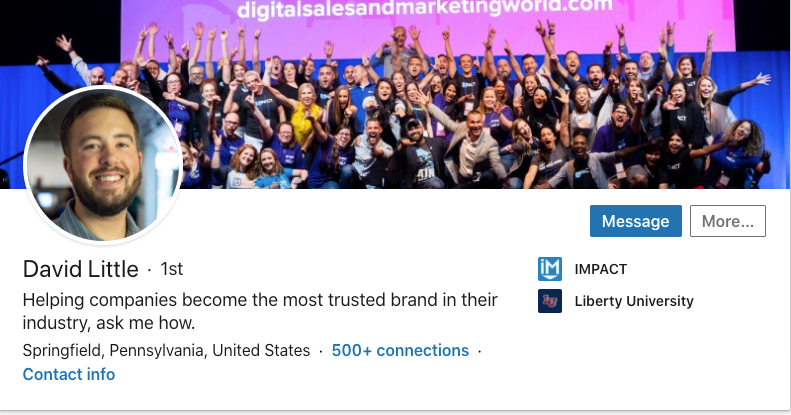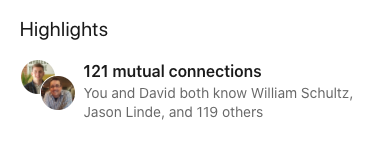Subscribe now and get the latest podcast releases delivered straight to your inbox.
“It’s good for my career.”
This is typically the sentiment around LinkedIn when most people, in or right out of college, first sign up. It seems like people these days just feel like they should be there because someone told them to. And well, they weren’t wrong!
You should be on LinkedIn. It has proven to be an extremely effective tool for growing your career and your business — especially while social distancing orders have made virtual selling more important than ever.
But that’s just it: It’s a tool, not a strategy.
🔎 Related: LinkedIn sees surging engagement during coronavirus, but ad revenue lags
Seventy-six percent of buyers are ready to have sales conversations on social media, regardless of what industry you’re in. That is why today, we’re going to talk about how to use LinkedIn more effectively so you can close deals.
To be clear, if you're looking for cold LinkedIn message templates or how to become the next great LinkedIn influencer, there's other content that may be more up your alley:
- Marcus Murphy gave an excellent talk at Digital Sales & Marketing Day that focused on the tactical and tested techniques that his sales team used to start sales conversations on LinkedIn.
- Becc Holland has a tried-and-true cold outreach formula that focused on LinkedIn activity.
These sessions outline what you need to know and I have no reason to try and reinvent it, but if you're looking for a resource that will show you exactly how to operate on LinkedIn and use it as a trust-building tool so an average, every day, digital sales professional can close more deals, then you've come to the right place.
If you already know you should be on LinkedIn to target people and identify prospects, you probably already know that the tactics alone are just not enough. These tactics and formulas are useless unless you check some other boxes.
Let’s dive into what those other things are and start making our way to closing more deals.
1. Complete your profile
Remember when you were growing up and your parents told you not to talk to strangers? — especially strangers on the internet for us millennials (I’m looking at you AIM chat rooms!) This bit of advice still drives the decisions we make as adults.
Think about it. When a stranger approaches you on LinkedIn to sell you something, your guard is likely up.
You don’t know this person. You have no reason to believe what they are selling is legitimate or a reason to trust anything they say.
As a sales professional, your LinkedIn profile is your number one way to get around this hurdle.
Data shows that completing your profile can have a big impact on your sales efforts both on and off LinkedIn.
The IDC found 75% of B2B buyers and 84% of C-level executives consult social media before making purchasing decisions, and more specifically, 48% of buyers said they researched vendors by looking at their profiles on LinkedIn before making a purchasing decision.
A complete LinkedIn profile gives you credibility. It shows you're a professional with experience and give prospects more insight into why they can trust you.
🔎 Related: 27 powerful LinkedIn business pages examples to inspire you
A trustworthy profile includes a headline, professional headshot and banner, complete job and education history, a short “about” biography, certifications, and a few endorsements from colleagues among other things.
A great example of a completed profile from IMPACT Account Executive, David Little.

David checks every box of a trustworthy profile with a professional photo, headline, activity, endorsements, and comprehensive job history.
He is a fantastic example of how you can use social media to legitimize yourself and the company you represent on LinkedIn without having to become influencer of the year.
2. Capitalize on existing connections
Effectively navigating your network to make new connections is a game-changer for salespeople trying to close more deals on LinkedIn because B2B buyers are five times more likely to engage when introduced by an acquaintance.
LinkedIn makes it easy to see who connects you to, well, anyone. Check out my mutual connections with David.

If David was a prospect I didn’t know, looking at LinkedIn, I have 121 different ways to get introduced and start a conversation.
If you share a common connection with a prospect, look for an introduction instead of or before cold calling/emailing. Having this connection vouches for you in a way and makes you more trustworthy in the eyes of the prospect.
Seeing as 84% of B2B decision-makers kick off their buying processes with referrals, an introduction can do wonders for your deal pipeline.
3. Post frequently
92% of B2B customers are willing to engage with sales reps who have positioned themselves as an industry thought leader.
Posting frequently on LinkedIn shows that you know your stuff and that you are a legitimate expert in your field. It shows that you are engaged in your work, are genuinely interested in what you do for a living, and have insights to share.
You give prospects a reason to trust any advice you give them and believe you’re not just in it to close another deal.
Get started by posting weekly about industry news, recent trends, or observations. These are the little things that separate you from a run of the mill salesperson and add value to your prospects and clients when they aren’t actively engaged in the sales process with you.
And use video! Not only does video on LinkedIn get shared 20x more than other posts, it gets your face and voice out to your audience, increasing your credibility even more.
4. Lead with value
Have you ever gotten a message from someone that looks something like “I saw your profile and you look like a prime target customer, would you be interested in a chat?”
This is as sloppy as it gets for a salesperson.
All this says to the person receiving the message is that you didn’t do your homework on them, or their company, and only want to talk because they look like someone who has money. This is absolutely the wrong thing to do.
The fact is that 62% of B2B customers respond to salespeople who connect by sharing content and insights that are relevant to the buyer and 90% of B2B decision-makers never respond to cold outreach.
Stop wasting yours with empty outreach and lead with something of value for the prospect.
That typically means identifying a problem the recipient has that you and your product/service can solve.
If you’re having trouble finding a rock-solid premise for your prospecting outreach, I recommend (as mentioned at the top of this article) watching “How to Pick 5 Premises for Your Prospects in Under 5 Minutes” by Becc Holland.
In this lesson, Becc lays the foundation for how to create an outreach premise that is rooted in delivering value first and solicits a response.
At the end of the day, the more responses you get to your sales outreach, the more opportunities you have to close deals.
LinkedIn is a tool, not a strategy
LinkedIn can be valuable to your sales process. Like any tool you introduce to your tech-stack, it needs to be used for its intended purpose and not just to “check the box”.
If you plan to sell on LinkedIn be sure to have a plan in place to get your profile complete, use your existing network, commit to publishing regularly, and lead with value. Have an outreach strategy with all of the above in mind, and you'll set yourself, and your prospects, up for success.


Order Your Copy of Marcus Sheridan's New Book — Endless Customers!

